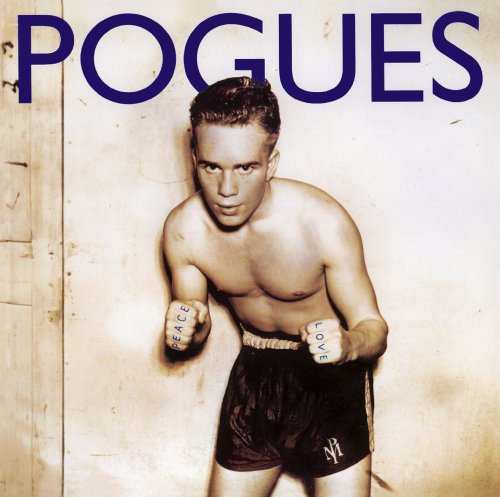|
|
|
01 |
Gridlock |
|
|
|
03:33 |
|
|
02 |
White City |
|
|
|
02:31 |
|
|
03 |
Young Ned Of The Hill |
|
|
|
02:45 |
|
|
04 |
Misty Morning, Albert Bridge |
|
|
|
03:01 |
|
|
05 |
Cotton Fields |
|
|
|
02:51 |
|
|
06 |
Blue Heaven |
|
|
|
03:36 |
|
|
07 |
Down All The Days |
|
|
|
03:45 |
|
|
08 |
USA |
|
|
|
04:52 |
|
|
09 |
Lorelei |
|
|
|
03:33 |
|
|
10 |
Gartloney Rats |
|
|
|
02:32 |
|
|
11 |
Boat Train |
|
|
|
02:40 |
|
|
12 |
Tombstone |
|
|
|
02:57 |
|
|
13 |
Night Train To Lorca |
|
|
|
03:29 |
|
|
14 |
London You're A Lady |
|
|
|
02:56 |
|
|
|
| Country |
United Kingdom |
| Spars |
DDD |
| Sound |
Stereo |
|
|
|
PEACE AND LOVE
WEA (Pogue Mahone NYR-2) (1989)
Island 422-842-838-2
Formats: LP, Cassette, CD
There was a US test pressing made with a hand written lable and no sleeve. There were 25 of these made.
AMG EXPERT REVIEW: Shane MacGowan's potent appetite for alcohol was evident from the time the Pogues cut their first album, but by the time they got to work on Peace and Love in 1989, it was evident that he'd gone far past the point of enjoying a few pints (or many pints) and had sunk deep into drug and alcohol dependence. The Pogues were always far more than just MacGowan's backing band, but with the group's principal songwriter and lead singer frequently unable to rise to the occasion, the recording of Peace and Love became a trying experience, with the rest of the band often scrambling to take up the slack for their down-for-the-count frontman. Given the circumstances, the Pogues deliver with greater strength than one might expect on Peace and Love; while MacGowan's vocals are often mush-mouthed and his songwriting is markedly beneath his previous standards, Terry Woods contributes two terrific traditional-style numbers ("Young Ned of the Hill" and "Gartloney Rats"), Philip Chevron's "Lorelei" is a superb tale of lost love (he and Daryl Hunt also teamed up for a fine bit of Celtic-calypso fusion on "Blue Heaven"), and Jem Finer brought along a trio of strong originals. Musically, Peace and Love found the band stretching their boundaries, adding accents of film noir jazz on "Gridlock," rockabilly on "Cotton Fields," straight-ahead rock on "USA," and power pop on "Lorelei," though the group's highly recognizable Celtic-trad-on-steroids style is never far beneath the surface. Peace and Love isn't as good as the two Pogues albums that preceded it (which represent the finest work of their career), but it does make clear that Shane MacGowan was hardly the only talented songwriter in the band - though the fact that the set's most memorable songs were written by others did not bode well for the group's future. - Mark Deming
Kirsty MacColl - Vocals
The Pogues - Arranger
Albert Bridge - Bass, Strings
Joe Cashman - Sax (Tenor)
Philip Chevron - Vocals
Brian Clarke - Sax (Alto)
Chris Dickie - Engineer
James Fearnley
Jem Finer
Darryl Hunt
Nick Lacey - Assistant Engineer, Assistant
Gaspar Lawal - Percussion
Steve Lillywhite - Producer
Shane MacGowan
Frank Murray - Management
Peadar У Riada - Arranger, String Arrangements
Andrew Ranken
Spider Stacy
Eli Thompson - Trumpet
Fiachra Trench - Arranger, String Arrangements
Rick Trevan - Sax (Tenor)
Terry Woods
Ryan Art - Design, Cover Design
Steve Pyke - Portraits
Philip Hardaker - Sleeve Notes
Paul Taylor - Trombone, Arranger, Brass Arrangement
CD Island 422-842838-2
CD Island 7 91225-2
1998 CD Wea International 46086
1990 CD Polygram 842838
LP Island 422-842838-1
CS Island 422-842838-4
